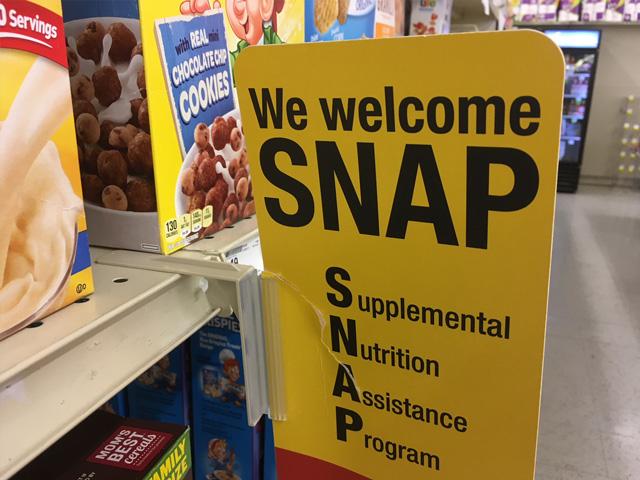Right, Left Split on Debt Limit Deal
Ag Largely Not Affected in Debt Limit Deal, But Food Aid Requirements Change for Some
OMAHA (DTN) -- Farm programs would come out of the debt-ceiling debate largely unscathed as lawmakers gnash their teeth over a compromise spending and debt-limit bill that needs to clear both chambers by June 5.
The bill, the Fiscal Responsibility Act, released over the weekend by Rep. Kevin McCarthy, R-Calif., would cover U.S. debt obligations through Jan. 2, 2025, raising the debt ceiling in the process. The House was called back into session to vote on the bill.
A key part of the bill changes eligibility under the Supplemental Nutrition Assistance Program (SNAP) for single people in their 50s and also could take away some rural broadband funds from USDA. The bill, however, keeps intact much of the Inflation Reduction Act, including its renewable energy tax credits and funding provided to USDA for conservation programs.
Bill backers stressed the bill doesn't affect Social Security, Medicare, Medicaid or benefits for veterans.
The plan ideally is the House will pass the bill sometime late Wednesday. The Senate would be on the clock after that.
The House Rules Committee met Tuesday afternoon in essentially a kickoff of criticisms about the bill. Each side declared the other party's responsibility for bringing the country to another dramatic series of votes over the debt ceiling and budget cuts.
"A lot of Republicans are disappointed that many of the provisions in that bill, if not most of the provisions in that bill, did not make it into this bill," said Rep. Tom Massie, R-Ky., referring to the "Limit, Save and Grow Act," the budget bill initially passed by House Republicans in April.
P[L1] D[0x0] M[300x250] OOP[F] ADUNIT[] T[]
Massie, however, also pointed to language in the bill that indicated another 1% cut in spending if the House and Senate do not pass all 12 spending bills for FY 2024.
"It's not perfect. I would personally want it to be better," said Rep. Ron Estes, R-Kansas, a member of the House Budget Committee. "It does put some limits on the spending, which is really where we need to go."
The bill got significant pushback Tuesday from lawmakers on both sides of the aisle. Republicans House members who are members of the House Freedom Caucus held a press conference at the Capitol calling on their colleagues to vote against the bill. Others took their opposition to social media.
"Absolutely no one wants to default but this current deal is unacceptable. I have read this bill twice and as the language currently stands, I will be voting no to raise the debt ceiling," stated Rep. Kat Cammack, R-Fla., a member of the House Agriculture Committee. Cammack added disappointment that the bill doesn't include more regulatory reform.
A briefing by White House staffers on Tuesday highlighted the bill would essentially leave nonmilitary spending as essentially flat for the Fiscal Year 2024 budget.
On SNAP, Republicans stressed changes in eligibility for able-bodied adults up to age 55 would lead to more people taking eligible jobs. The bill, however, protects the ability for states to maintain those job waivers in areas with high unemployment. The age limit for SNAP would increase incrementally through 2025. But the bill also takes away some SNAP restrictions for veterans, homeless people and former foster youth through age 24.
Rep. Jim McGovern, D-Mass., ranking member of the House Rules Committee, who also serves on the House Agriculture Committee, noted there have not been any hearings about the population of single adults on SNAP. He said those people don't all fit into categorical boxes, but the budget looks to affect lower-income people without understanding how they will be affected.
"People are going to fall through the cracks," McGovern said. He added, "It's hard to get a job if you are over 50. You may not have the skill set. Also, depending on where you live -- if you live in a rural area, you don't have public transportation."
Rep. Mike Thompson, D-Calif., agreed with McGovern but also said the compromise bill "would avert an economic disaster" and needs to be passed.
At least a few Democrats also questioned why Republicans pushed for the SNAP changes in a debt-limit bill when the House Agriculture Committee is already working on the next farm bill.
"We're in the middle of the farm bill. That's where you deal with that. We already have work requirements. If you think they need to be amended, the farm bill is the place to do that," Thompson said.
Before the bill text was released, Center on Budget Policy and Priorities President Sharon Parrott said in a statement that the SNAP provisions would put hundreds of thousands of people between ages 50-54 at risk of losing food assistance.
"A large share of low-income adults in this age range are in poor health; many of them will lose basic assistance they need to buy groceries because they aren't able to meet the work-reporting requirement; and the exemption system, notoriously laden with red tape, won't work," Parrott said.
Rep. Jason Smith, R-Mo., chairman of the House Ways & Means Committee, also pointed to other job requirements for Temporary Assistance for Needy Families (TANF). Smith said the changes to TANF "are the most meaningful in the past two decades." Smith said the provisions put more pressure on states to report work outcomes from TANF recipients.
Chris Clayton can be reached at Chris.Clayton@dtn.com
Follow him on Twitter @ChrisClaytonDTN
Jerry Hagstrom can be reached at jhagstrom@nationaljournal.com
Follow him on Twitter @hagstromreport
(c) Copyright 2023 DTN, LLC. All rights reserved.



